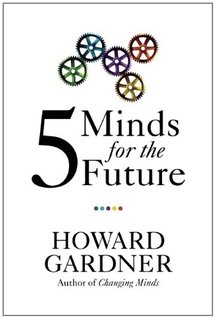
We live in a time of vast changes that include accelerating globalization, mounting quantities of information, the growing hegemony of science and technology, and the clash of civilizations. Those changes call for new ways of learning and thinking in school, business and the professions. In Five Minds for the Future, noted psychologist Howard Gardner defines the cognitive abilities that will command a premium in the years ahead:
Armed with these well-honed capacities, a person will be equipped to deal with what is expected in the future-as well as what cannot be anticipated. Without these “minds”, individuals will be at the mercy of forces they can’t understand-overwhelmed by information, unable to succeed in the workplace, and incapable of making judicious decisions about personal and professional manners. Renowned worldwide for his theory of multiple intelligences, Gardner takes that thinking to the next level in this book. Concise and engaging, Five Minds for the Future will inspire lifelong learning in any reader and provide valuable insights for those charged with training and developing organizational leaders-today and tomorrow. About the Author The author of fifteen books, eminent Harvard psychologist Gardner revolutionized our understanding of intelligence, creativity, and leadership with such books as Frames of Mind, Creating Minds and Leading Minds. Related item: In this lecture series, filmed at the Royal Society for the Arts in London, Harvard professor Howard Gardener examines the mental capacities needed for the future in a globalized world. Watch the video (Description from Teachers TV, UK) (Runtime: 60 minutes) Staff Review: Book: Five Minds for the Future Author: Howard Gardner Book Review By: Carrie Ann Taylor Harvard professor Howard Gardner has made a career out of studying the human mind: how humans learn, create, communicate, and change. In Five Minds for the Future, Gardner concerns himself with the kinds of minds people must have in order for both individuals and humanity as a whole to thrive in a rapidly changing world. In his introduction, Gardner acknowledges that this book involves a clear shift from description to prescription; that is, in Five Minds he not only describes what he has learned, he makes explicit value-laden judgements about how he thinks we should choose to develop and use our minds to meet the challenges of the future. In the interconnected world in which the vast majority of human beings now live, it is not enough to state what each individual or group needs to survive on its own turf. In the long run, it is not possible for parts of the world to thrive while others remain desperately poor and deeply frustrated. Recalling the words of Benjamin Franklin, “We must indeed all hang together, or, most assuredly, we shall all hang separately.” Further, the world of the future…will demand capacities that until now have been mere options. To meet this new world on its own terms, we should begin to cultivate these capacities now1.
Identifying and promoting the development of these necessary ‘capacities of mind’ is the core purpose of this book.
Gardner’s concept of ‘mind’ is distinct from his earlier work in naming and describing various ‘intelligences’. The word ‘mind’, in this context, refers not to individual proclivities or distinct ways of knowing, but to broad uses of the mind that anyone can cultivate, employ, and master. Gardner presents a list of the five key capacities he sees as most necessary in order for humans to thrive in the future. The five minds are2:
The book proclaims that our society must embark on a project to actively nurture and cultivate these capacities in our younger generations. In addition, he argues, we should do everything we can to mobilize such skills and attitudes in the adults who are making decisions and organizing society in the present day. It is the development of these mental capacities in young people, however, that is the primary concern of Gardner in this work, and his vision is transformative and far-reaching. We must re-envision the goals and structure of education, he asserts, for two main reasons: one, current practices are not actually working (throughout the book he notes the ways in which many traditional teaching methods do not meet their objectives), and two, conditions in the world are changing so significantly that certain goals and practices of the past may no longer be useful and may, in fact, even be counterproductive in the present reality (for example, in the past we need to memorize large volumes of facts and information, now it is more important that we have the ability to survey and organize the huge amount of information available to us). “Education is inherently and inevitably an issue of human goals and human values,” Gardner asserts, and “one cannot even begin to develop an educational system unless one has in mind the knowledge and skills that one values, and the kind of individuals one hopes will emerge at the end of the day3”. We need a vision, he reminds us, and then asks starkly: ‘Do we have one?’ Of course, offering and developing such a vision is at the heart of this book.
In making his recommendations for change Gardner makes explicit his intention to include, but go far beyond ‘ brain science’. Gardner reminds us that modern science has provided us with a significantly new understanding of how the human mind works – how it learns, solves problems, the nature of intelligence and creativity – and he states this knowledge must be incorporated into our educational institutions. But while the modern perspectives of science and technology may inform and shape both how we teach and what we teach, we must not neglect the wholeness of what it means to be human. Beyond the perspectives of science and technology, Gardner insists, we need the deep truths of the humanities, of art, civics and the knowledge of the body. “A full life, Gardner reminds us, “like a full organization, harbours multiple disciplines4”.
With references to the situations and structures of the business world at least as frequent as of those to the classroom, Gardner provides clear direction and many concrete examples of how his objectives might be put into practice. But whether in acknowledgement of the level of expertise of others or in regard to the sheer unmanageability of making concrete recommendations that are do-able in all sectors of society, Gardner chooses to leave most of the ‘on the ground’ implementation of his ideas to leaders, educators, workers, parents and citizens to apply as appropriate in each of their respective milieus.
This book is not so much a “how to” book as an enquiry into who we will need to ‘be’ to succeed in an uncertain future. In keeping with his view that all sectors of society must participate in effecting a change in how we think, learn, work and live, Gardner has written a book aimed at a wide and varied audience. Gardner stresses that the task of developing our minds for the future must be embraced in all segments of society. Families, schools, media, workplaces, professions, governments and politicians must all incorporate and promote the qualities of the five minds, he argues, in order to effect broad-based and meaningful change. Broad and sweeping in its analysis, Gardner offers a ‘big picture’ look at how technology and globalization have transformed contemporary society, thus requiring a new framework for understanding and response. Policymakers the world over have yet to understand the profound and permanent shift that our world is undergoing, he insists, where we need to consider local, regional, national and global realities and concerns all at once. And Gardner sees schools at the heart of the change required. “I believe”, Gardner states, “that current formal education still prepares students primarily for the world of the past, rather than for possible worlds of the future….[we have] not yet figured out how to prepare youngsters so that they can survive and thrive in a world different from one ever known or even imagined before5”.
Five Minds’ provides a theoretical framework for educators, leaders and, indeed, all citizens, to recognize and respond to the world as it is and as it will become. Without developing the capacities of the five minds, Gardner fears, we will not be able to adequately address – or even understand – the problems and opportunities before us. Gardner calls upon his readers to acknowledge and attend to our common challenges and shared fate as members of a global society.
|
Children raised with the computer “think differently" from the rest of us. They develop hypertext minds. They leap around. It’s as though their cognitive structures were parallel, not sequential. Featured VideoPrograms at Work |
- Gardner, Howard. Five Minds for the Future. Boston: Harvard Business School Press, 2006, p. 2.
- Note: summaries of the five minds, above, quoted directly from book jacket.
- Gardner, pp. 13-14.
- Gardner, p.15.
- Gardner, p. 17.



